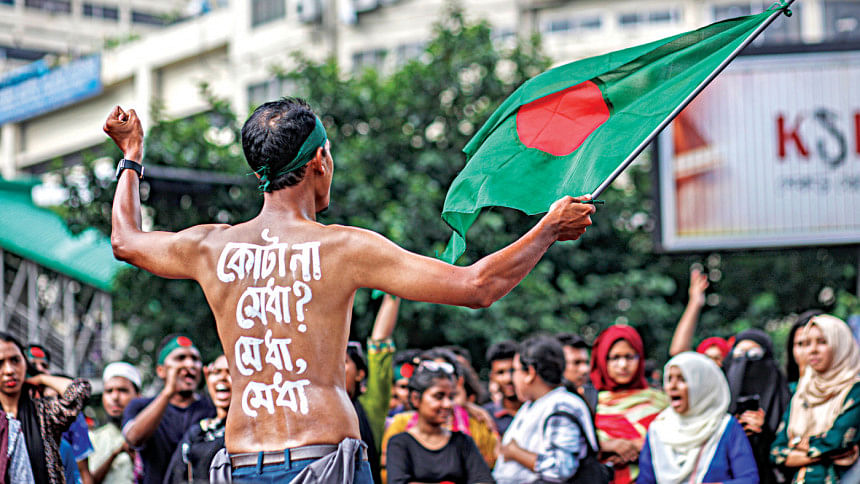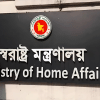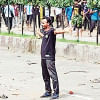Anti-quota protests swell across univs

Anti-quota protests intensified across the country yesterday as students of more universities joined in, and the demonstrators announced fresh programmes to press for scrapping of the quota system in government jobs.
Earlier in the day, the Appellate Division of the Supreme Court decided to uphold until further orders the June 5 High Court verdict. The HC verdict reinstated the quota system after terming illegal a 2018 government circular that abolished it. The decision was announced around 10:00am.
Protesters said they will bring out processions on college and university campuses on Saturday and boycott classes and exams on Sunday, demanding the reinstatement of the government's 2018 circular.
University students in and around Dhaka were demonstrating against the HC verdict for the last several days.
As part of the demonstrations, they blocked key intersections in the capital and highways for several hours, causing sufferings to the commuters.
Nahid Islam, an organiser of the movement, said the mainstay of the country's constitution and spirit of the Liberation War is equality for all.
"The crisis over the quota system should be resolved keeping in mind the public opinion. But we are seeing the system is being reinstated, ignoring public opinion. We'll continue our movement until our demands are met," he said during a procession at Dhaka University.
He added, "We're not against the freedom fighters; rather, we have no objection to increasing the facilities for those who are real freedom fighters. But we want the quota system gone."
Their demands include the formation of a commission to reform the quota system and also to ensure vacant positions are filled with candidates selected on merit in the absence of quota candidates.
Also, they demand that individuals be allowed to use the quota system only once in their lifetime for any type of competitive public examinations, including university entrance tests.
THE SC SAYS
Yesterday morning, a six-member bench of the Supreme Court's Appellate Division, headed by Chief Justice Obaidul Hassan, held a hearing on the government's petition for a stay on the HC verdict that termed its 2018 circular abolishing quotas illegal.
However, much to the dismay of the protesters expecting a stay, the apex court asked the government to submit a leave-to-appeal petition after the full text of the HC judgment is released.
The HC verdict came on June 5 this year, following a 2021 writ petition that challenged the legality of the quota abolishment.
Since then, students have taken to the streets demanding the reinstatement of the government circular.
PROTESTS ESCALATE
Once the news of the Appellate Division's decision spread, students of Dhaka University began gathering in front of the Central Library from 11:00am.
They brought out processions on different roads on the campus and around 12:20pm blocked the Shahbagh intersection, for the third consecutive day. They stayed there till 6:00pm.
Despite bouts of rain, the students stayed put, chanting slogans like "Bury the quota system", "No place for discriminations in my golden Bangla", "No more tears for the meritorious", and "Keep the country's talent in the country, abolish the quota system".
They also sang patriotic songs and recited poems.
Meanwhile, traffic came to a halt on the roads leading to Bangla Motors, Science Lab and Kakrail due to the blockade.
On the other hand, leaders and activists of Chhatra League, the pro-ruling party student body, took position at different dormitories, including Zahurul Huq Hall and Surja Sen Hall, to prevent students from joining the protests.
Asaduzzaman Farid, joint secretary of Zahurul Huq Hall BCL, said they were on alert to prevent the anti-quota demonstrations at the hall.
Sharjis Alam, a master's student of Zoology and one of the leaders of the anti-quota protesters, was allegedly forced to vacate the Amar Ekushey Hall of DU around 10:00pm.
He claimed that Chhatra League leaders in the dorm forced him to leave.
As the news spread, hundreds of students from different halls gathered in front of the dorm around 11:45pm and started chanting slogans.
Hall provost Prof Ishtiaq M Sayed was seen trying to calm the students.
Saddam Hossain, president of Amar Ekushey Hall unit of Chhatra League, said they did not force anyone to leave the dorm. "Who stays or not depends on the hall authority, not them."
Around 1:00pm, students of Sher-e-Bangla Agricultural University blocked the Agargaon thoroughfare for an hour, said Ahad Ali, officer-in-charge of Sher-e-Bangla Nagar Police Station.
Jagannath University students also blocked roads near their campus on Chittaranjan Avenue and Ray Saheb Bazar for over an hour and half since 12:00pm.
They too shouted anti-quota slogans such as "No place for discriminations in Bangabandhu's Bangla", "Rise again with the spirit of '18", "Let the meritorious be free!".
The blockade caused traffic congestion on both roads.
Helal Ahmed, one of the protesters, said, "We'll continue our movement until the quota system is abolished."
Students of Jahangirnagar University brought out a procession on campus and then blocked the Dhaka-Aricha highway around 12:20pm for almost an hour, leading to traffic jams.
AFM Sayeed, officer-in-charge of Ashulia Police Station, said though the blockade was lifted around 1:00pm, it took time for traffic to go back to normal.
Cumilla University students blocked the busy Dhaka-Chattogram highway, a commercial artery between the capital and the port city, in Beltali area of south sadar upazila for three hours from 12:30pm.
They lifted the blockade only after Deputy Commissioner Khandaker M Musfiqur Rahman and Superintendent of Police Abdul Mannan ensured that the protesters' message would be conveyed to the higher authorities.
After a procession on their campus, several thousand students of Rajshahi University braved the rain and blocked the Dhaka-Rajshahi highway for over two hours from around 10:00am. Slogans like "Let the weapon of 2018 roar again", "We want merit-based recruitment, no quotas except for the disabled" were chanted.
Hundreds of Chittagong University students blocked the Chattogram-Khagrachhari highway for around two hours from 11:45pm.
Fatema, a sociology student, said, "Because of the quotas, meritorious students are not being recognised. It's unacceptable that a talented student with high exam scores may not get a job while some others can, benefiting from the quota system."
The Barishal-Kuakata highway was also blocked by students of Barisal University for five hours.

QUOTA SYSTEM
The quota system has long been criticised as the reason for bureaucracy being devoid of merit in the long run.
While giving a lecture at Dhaka University in January 2018, the late Akbar Ali Khan, a former adviser to a caretaker government and former cabinet secretary, had said it was "the biggest problem in the cadre service".
He said, "No other country in the world has such a bizarre system."
A study conducted by Akbar Ali Khan and Kazi Rakibuddin Ahmad, also a former secretary and former chief election commissioner, recommended reducing the number of quotas.
In the report, which they submitted to the Public Service Commission in 2008, they termed the system "unjust".
In 2018, the government issued the circular, abolishing the quota system, in the wake of massive student protests for reforms.
Until then, about 56 percent of government jobs had been reserved for candidates from various quotas. Of this, 30 percent were for the children and grandchildren of freedom fighters; 10 percent for women; 10 for people from underdeveloped districts; five for members of indigenous communities, and one percent for persons with physical disabilities.
The quota system was introduced through an executive order in 1972 and had been amended several times since.
From 1972 to 1976, 20 percent were recruited on merit.
Merit-based recruitment then increased to 40 percent in 1976, which continued till 1985 before it was further upped to 45 percent.

 For all latest news, follow The Daily Star's Google News channel.
For all latest news, follow The Daily Star's Google News channel. 








Comments